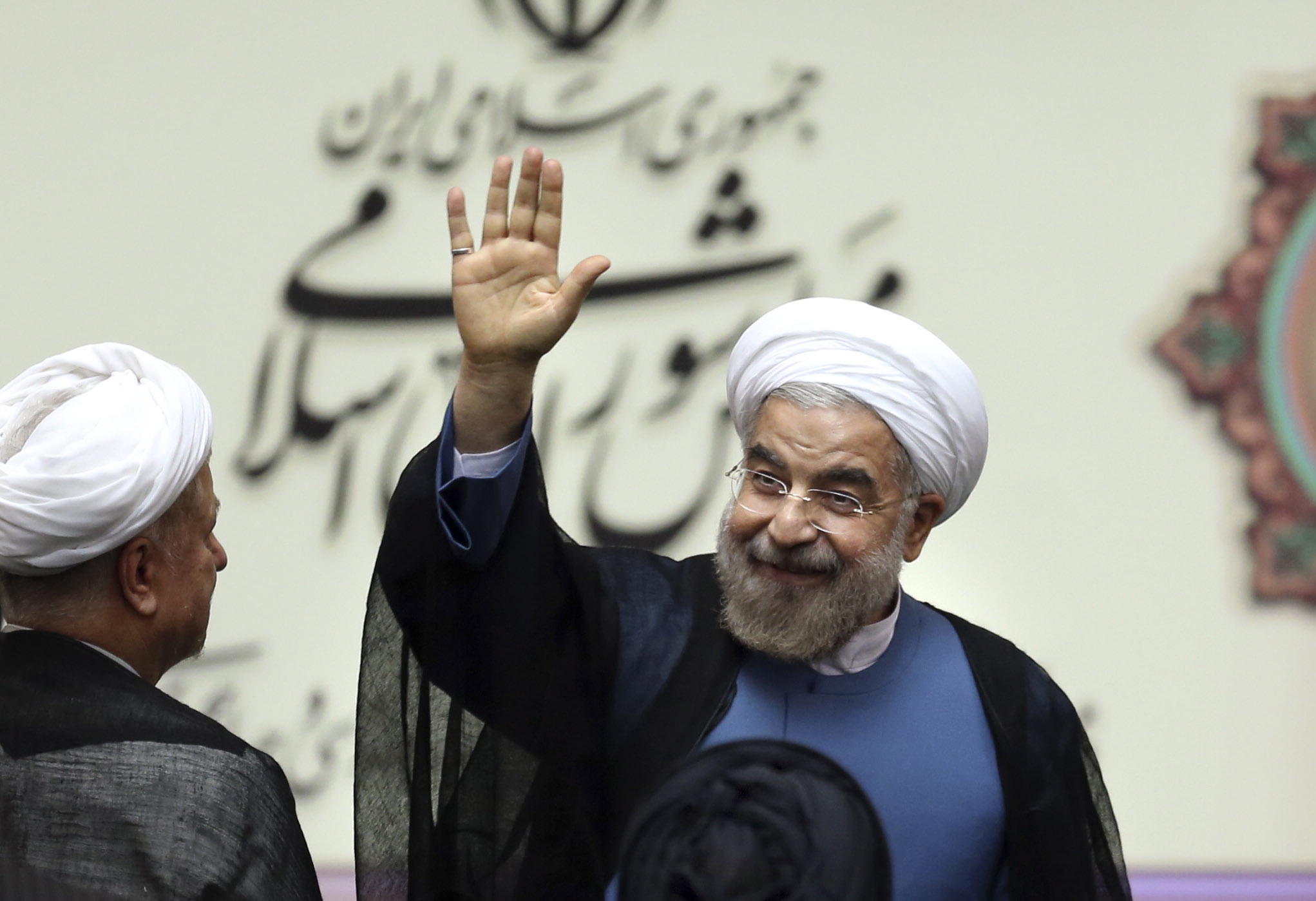TEHRAN, Iran — Hassan Rouhani, a moderate cleric, was sworn in Sunday as Iran’s new president, officially ending the controversial eight-year, two-term presidency of Mahmoud Ahmadinejad.
“Everyone that voted for me or for other candidates and also those who did not vote at all are all Iranian citizens and have equal civil rights,” Rouhani said. “I am the legal representative of the entire nation.”
Rouhani, who won a landslide victory in the June 14 presidential elections, wasted no time in distinguishing his style from that of his often-provocative predecessor, delivering an inauguration speech that touched on his campaign promises of improving Iran’s economy, mending foreign relations and giving greater social freedom to its citizens, but not at the expense of Iran’s national interests.
For the first time, foreign dignitaries were invited to attend the swearing in of an Iranian president. Diplomats from dozens of countries and several heads of state, including president of neighboring Afghanistan, Hamid Karzai, attended the ceremony.
Rouhani also used his first speech as Iranian president to send a message to the United States and its Western allies, who have imposed severe economic sanctions on Iran over its disputed nuclear program.
“The only way to interact with Iran is to have dialogue from an equal position, creating mutual trust and respect and reducing enmities,” Rouhani said. “Let me state it clearly that if you want a positive response, talk to Iran not with a language of sanctions, but a language of respect.”
Tehran says its nuclear program is for peaceful purposes only, but the United States and its Western allies suspect that the country wants to build a nuclear weapon.
In Washington, White House press secretary Jay Carney congratulated Rouhani and said his inauguration “presents an opportunity for Iran to act quickly to resolve the international community’s deep concerns over Iran’s nuclear program.”
“Should this new government choose to engage substantively and seriously to meet its international obligations and find a peaceful solution to this issue, it will find a willing partner in the United States,” Carney said in a statement.
The two countries have not had diplomatic relations since 1979.
While foreign policy issues are a priority for Rouhani, so too are regaining the public trust and helping repair the damage suffered in recent years by Iran’s economy, which faces an inflation of more than 40 percent, decimated purchasing power and rising unemployment.
“The Government of Hope and Prudence wants to bring back happiness to Iranians’ lives,” Rouhani said, referring to his campaign’s motto. “To achieve this, we have to increase national wealth and power, and assign those with wisdom as decision makers, trust nongovernmental organizations, increase privatization and have trust in people.”
The event was presided over by the powerful Larijani brothers, Ali and Sadegh, who are the speaker of the parliament and the head of the country’s judiciary, respectively, and both longtime foes of Ahmadinejad.
Rouhani is likely to find a parliament more willing to cooperate with him than it was with Ahmadinejad, who had multiple public spats with the Larijani brothers.
“The experience of recent years shows that development of the country is only possible by applying scientific theories and that hasty and unplanned projects will result in economic chaos in the long run,” Ali Larijani said in his opening remarks, an apparent jab at the conservative management style of the Ahmadinejad government.
While Rouhani has repeatedly stated his commitment to improving Iran’s relations with the rest of the world, Sadegh Larijani provided a reminder that no matter how committed to diplomacy he is, the new president will face challenges domestically from other political figures who believe that the Islamic republic must adhere to its fundamental ideological roots.
“The Islamic republic, while respecting other nations and using their experiences, will follow its own path based on the teachings of the Koran and sees no reason to imitate other countries,” Larijani said.
In indirect references to the civil war in Syria and the Israeli-Palestinian conflict, Rouhani stuck to Tehran’s familiar lines.
Iran, he said, opposes “any change in political systems through foreign intervention,” in an apparent reference to Western and Arab efforts to oust Syrian President Bashar Assad.
Rouhani also submitted his cabinet nominees for parliament’s consideration well ahead of the two-week deadline allotted in Iran’s constitution, and their resumes indicate that he will push early in his presidency to find diplomatic openings, perhaps even with the United States.
Several of Rouhani’s cabinet choices were educated in the United States, including the nominee for foreign minister, Mohammad Javad Zarif, who has been a longtime ambassador to the United Nations and is the Iranian official perhaps best known by American counterparts.
Zarif held the post in New York from 2002 to 2007 under President Mohammad Khatami and holds a Ph.D. in international law and policy from the University of Denver.
Like Zarif, other nominees share Rouhani’s pragmatic approach to foreign policy and most held positions in the cabinets of either Khatami or Ali Akbar Hashemi Rafsanjani.
The period from 1989 to 2005, when Rafsanjani and Khatami were presidents, is considered the era of most economic prosperity and constructive international relations in the Islamic republic’s 34-year history.



